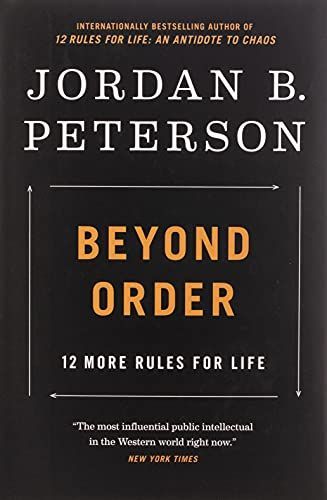
Beyond Order 12 More Rules for Life
A #1 New York Times and Sunday Times bestseller The long-awaited sequel to 12 RULES FOR LIFE, which has sold over 5 million copies around the world In 12 Rules for Life, acclaimed public thinker and clinical psychologist Jordan B. Peterson offered an antidote to the chaos in our lives: eternal truths applied to modern anxieties. His insights have helped millions of readers and resonated powerfully around the world. Now in this much-anticipated sequel, Peterson goes further, showing that part of life's meaning comes from reaching out into the domain beyond what we know, and adapting to an ever-transforming world. While an excess of chaos threatens us with uncertainty, an excess of order leads to a lack of curiosity and creative vitality. Beyond Order therefore calls on us to balance the two fundamental principles of reality - order and chaos - and reveals the profound meaning that can be found on the path that divides them. In times of instability and suffering, Peterson reminds us that there are sources of strength on which we can all draw: insights borrowed from psychology, philosophy, and humanity's greatest myths and stories. Drawing on the hard-won truths of ancient wisdom, as well as deeply personal lessons from his own life and clinical practice, Peterson offers twelve new principles to guide readers towards a more courageous, truthful and meaningful life.
Reviews
Tanishq Khandelwal@tanishq
Shuhang Cai@hangingwithshu
matej yangwao@yangwao
Omar@omareduardo
Kieran Wood@descent098
Jana Barkova@jana_bark
Tyler Rodrigues@tylerrosereads
Gerbert-Jan@gjrosmalen
Cristhian Tilleria@cristhian25
Christian Bager Bach Houmann@cbbh
Colton Ray@coltonmray
Kaye Oliva@okayewhatever
Rob@robcesq
Nenad Nikolic@nnikolic72
Matija@matijao
Sergei Khudovekov@khudovekov
Savanah Tujague@savanah2j
Fortune Atuakpoho@oldmateforty
Keven Wang@kevenwang
Drew Spartz@drewspartz
Maximilian Schulz@maximilianschulz
Nora Salman@noras
Patrick Baumann@pbaumann
Alex bell@redlion8